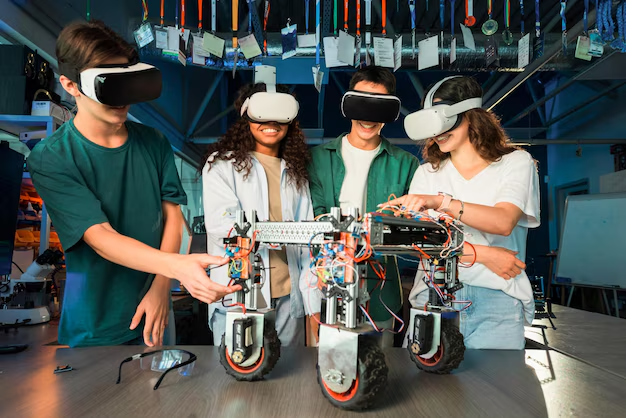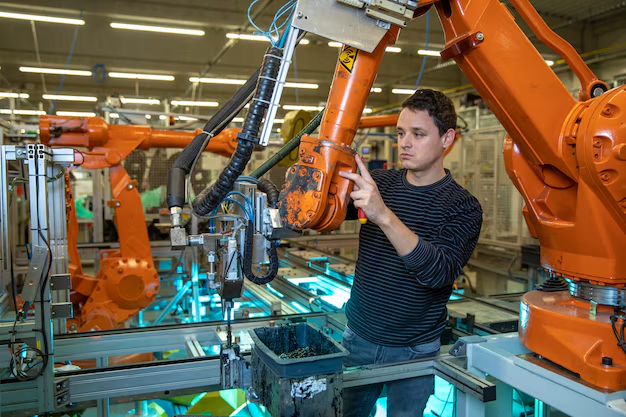Robotics has transitioned from a futuristic concept to a driving force reshaping industries and societies worldwide. With advancements in artificial intelligence (AI), machine learning, and automation, robotics is poised to revolutionize how we live and work. In this article, we will explore the impact of robotics on various sectors, from manufacturing and healthcare to education and everyday life, and how its integration is transforming the world as we know it.
1. What is Robotics?
Defining Robotics:
Robotics is the branch of technology that deals with the design, construction, operation, and application of robots. These robots are programmable machines designed to perform specific tasks with minimal human intervention. Robotics combines elements of engineering, computer science, and artificial intelligence to create intelligent systems capable of automating processes.
How Robotics Work:
Robots are equipped with sensors, actuators, and control systems that allow them to interact with their environment. They follow a set of programmed instructions or use AI to make real-time decisions. From simple machines performing repetitive tasks to complex robots capable of learning, the technology is continuously evolving.
2. The Role of Robotics in Industry
1. Manufacturing and Automation:
One of the most significant areas where robotics has made an impact is in manufacturing. Robotics has revolutionized the production line, increasing efficiency, consistency, and speed. Robots are used to assemble products, package items, and perform tasks like welding and painting with precision.
Key Benefits:
- Increased productivity and output
- Higher quality control
- Reduced human error
- Cost-effective operations
- Safer working environments
2. Agriculture and Farming:
Robotics is also transforming agriculture. Drones, automated tractors, and harvesting robots are enhancing the ability to monitor crops, automate planting, and increase yields. These advancements help optimize resource use and reduce labor costs, contributing to sustainable farming practices.
3. The Impact of Robotics on Healthcare

1. Surgery and Precision Medicine:
Robots in healthcare are playing a transformative role in surgery and diagnostics. Robotic-assisted surgeries allow for minimally invasive procedures, reducing recovery time and increasing precision. Surgeons use robotic systems for delicate procedures, improving patient outcomes and reducing human error.
Key Benefits:
- Precision and accuracy in surgeries
- Shorter recovery times
- Reduced risk of complications
- Better patient outcomes
2. Robotic Prosthetics and Rehabilitation:
Robotics also has a significant impact on rehabilitation and prosthetics. Advanced prosthetic limbs, powered by robotics, offer more natural movement and functionality. Rehabilitation robots help patients recover faster by assisting in physical therapy through precise movements.
4. Robotics in Education and Research
1. Enhancing Learning Experiences:
Robots are being integrated into classrooms, offering interactive learning experiences. Educators use robotics to engage students in STEM (Science, Technology, Engineering, Mathematics) subjects, making learning more hands-on and dynamic.
2. Advancing Scientific Research:
Robotics plays a vital role in scientific research, from exploring dangerous environments like deep oceans and space to conducting experiments in laboratories. Robots can handle tasks that are too hazardous or precise for human researchers, speeding up the process of discovery.
5. Robotics in Everyday Life
1. Household Robots:
Robots are becoming an integral part of daily life. Home robots, like vacuum cleaners and lawn mowers, are becoming increasingly advanced, offering convenience and time savings for individuals and families.
2. Service Robots:
In addition to household use, service robots are starting to make their mark in hospitality, retail, and customer service. These robots assist with tasks such as greeting customers, taking orders, and providing information, improving customer service and operational efficiency.
6. Challenges and Ethical Considerations
1. Job Displacement:
While robotics enhances productivity, one of the major concerns is its potential to displace workers. Many fear that as robots take over repetitive or dangerous tasks, jobs in certain industries may become obsolete. However, experts argue that robotics will create new job opportunities in tech, robotics maintenance, and engineering.
2. Ethical Dilemmas:
As robots become more autonomous and capable of making decisions, ethical concerns arise. For example, in healthcare, robots may make life-or-death decisions, and there may be concerns about privacy, accountability, and human oversight. Regulations and ethical frameworks will be necessary to guide the development of AI and robotics.
7. The Future of Robotics
1. Autonomous Robots:
The future of robotics lies in increased autonomy. Robots equipped with advanced AI will be able to make real-time decisions, adapting to changes in their environment without human intervention. This opens new possibilities in fields such as autonomous vehicles, delivery drones, and smart cities.
2. Collaborative Robots (Cobots):
Collaborative robots, or cobots, are designed to work alongside humans, enhancing human capabilities and improving workflow efficiency. Cobots are expected to play a significant role in the workplace by performing tasks that complement human workers without replacing them.
3. Artificial Intelligence and Robotics Integration:
AI and robotics are increasingly integrated, creating intelligent robots capable of learning from experience and making decisions on their own. This combination is expected to lead to breakthroughs in many industries, from manufacturing to healthcare.
8. Conclusion: The Future Is Now
Robotics is undeniably revolutionizing industries and societies, from automating manufacturing processes to advancing healthcare and transforming everyday life. While challenges and ethical concerns remain, the potential benefits of robotics are immense. As technology continues to evolve, it’s clear that robotics will play an integral role in shaping the future, making the world more efficient, connected, and innovative.
By embracing the power of robotics, we have the opportunity to create a smarter, more sustainable future, where human potential is enhanced by technology.
SEO Optimized Keywords:
- Impact of robotics on industry
- The future of robotics
- Robotics in manufacturing
- Robotics in healthcare
- Robotics in education
- Autonomous robots
- Artificial intelligence and robotics
- Service robots
- Robotic prosthetics
- Robotics in agriculture
- Robotics in daily life
- Benefits of robotics
- Robotics and job displacement
- Ethical concerns in robotics
- Collaborative robots
- Robotics research and development
- Robotics revolution
- Future of AI and robotics
- Robotic automation
- Healthcare robotics
- Industrial robots
- Robotics in STEM education
- Robotics in service industry
- Robotics technology
- Advances in robotics
- Household robots
- Smart robots for business

